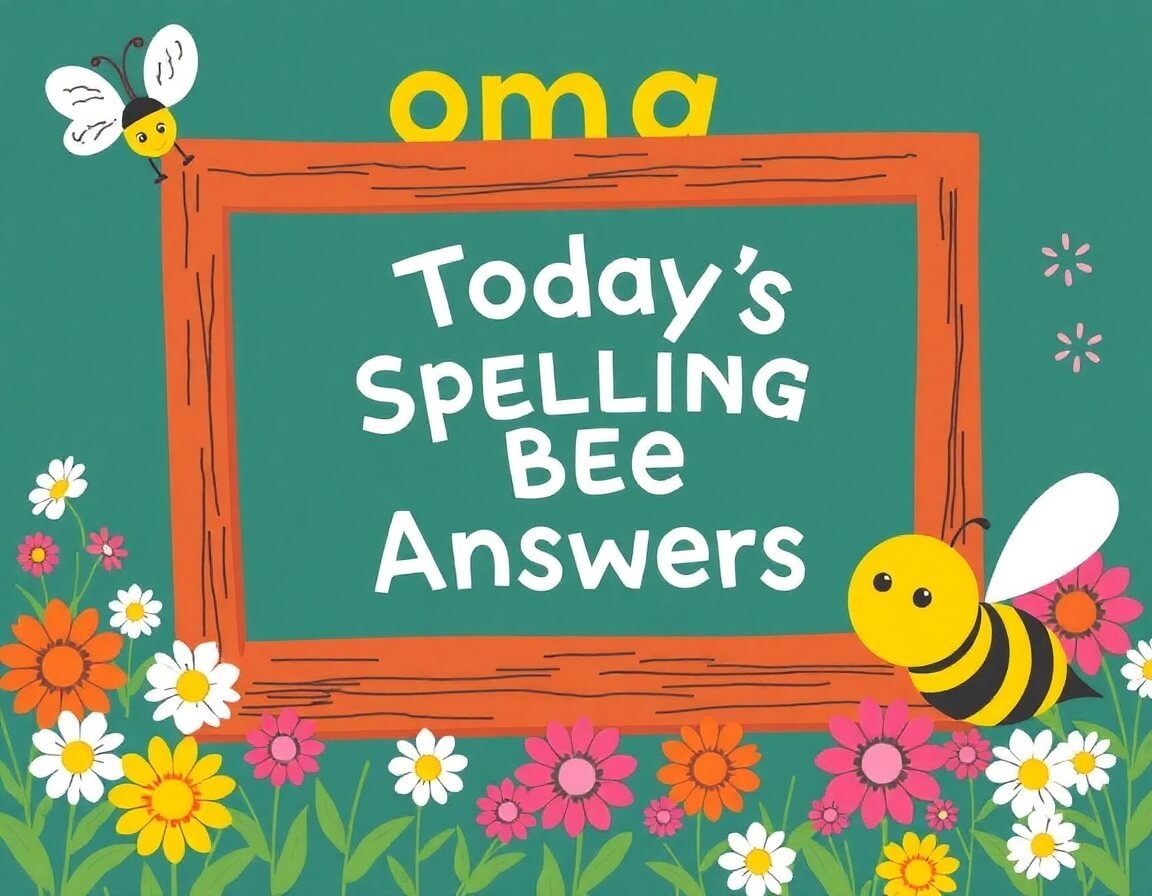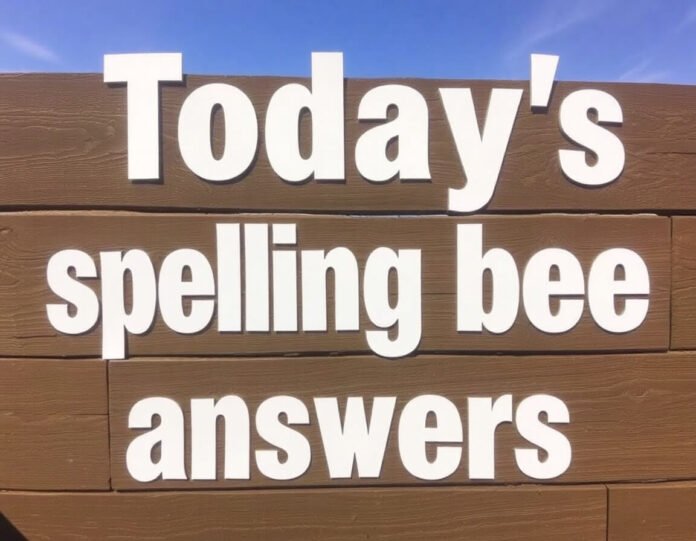Spelling bees are a time-honored tradition that challenges participants’ ability to spell words correctly under pressure. They provide an opportunity for students and adults alike to showcase their spelling skills, compete at various levels, and earn recognition for their mastery of the English language. Whether you are preparing for a local spelling bee or simply following along with today’s competition, understanding how to approach it, staying ahead of the curve, and accessing today’s spelling bee answers are crucial to success.
In this comprehensive guide, we will explore the concept of spelling bees, how to prepare for them, tips for participants, and the best ways to quickly find today’s spelling bee answers. Let’s dive in!
The Importance of Spelling Bees
Spelling bees are much more than just contests. They are a testament to the beauty and complexity of the English language. These events allow participants to develop valuable skills, such as:
- Vocabulary Building: Competing in a spelling bee helps students learn new words and understand their meanings. Each word in a spelling bee can come from various sources, including literature, science, and foreign languages.
- Concentration and Focus: A spelling bee’s environment is high-pressure, which helps improve concentration and enhance memory retention. Participants must focus on each letter and syllable, making spelling bees a great exercise in mental agility.
- Cognitive Benefits: Studies have shown that spelling bees help develop cognitive skills such as problem-solving, pattern recognition, and linguistic intelligence.
- Public Speaking and Confidence: Spelling bees help improve public speaking skills and self-confidence because participants often spell words out loud before an audience.
- Inspiring Learning: Spelling bees have inspired many students to pursue a love for words and languages, fostering a lifelong passion for learning.
How to Prepare for a Spelling Bee
For participants, preparing for a spelling bee requires commitment, focus, and a strategic approach. Whether you are preparing for a local competition or a more advanced level like the Scripps National Spelling Bee, here are key strategies to help you prepare:
1. Study Word Lists
Many spelling bees provide word lists, particularly for younger contestants. It’s important to memorize these lists and understand their phonetics. Make sure to:
- Break down the words into manageable chunks.
- Identify any complex syllables, letters, or foreign-language components.
- Use flashcards to test yourself regularly.
2. Learn the Origins of Words
Many spelling bee words come from languages like Greek, Latin, French, and German. Understanding the linguistic roots of a word can help you break it down and spell it correctly.
- Words from Latin may have a predictable pattern, making them easier to spell once you understand the root.
- Similarly, words of Greek origin may contain common letter combinations (like “ph” for “f” sounds).
3. Use Mnemonics and Visualization
Developing mnemonics or visualization techniques can help you remember tricky spellings. For example, for the word “accommodate,” you could place the double “c” and double “m” by thinking, “two c’s, two m’s, and a door.”
4. Practice with Mock Competitions
Set up mock spelling bees to simulate the actual event. This will help you get used to the pressure of spelling under a timed environment and train your concentration and focus.
- Ask a teacher or family member to read words aloud for you.
- Try to simulate the environment by standing up and spelling aloud in front of an audience.
5. Use Technology to Your Advantage
Many websites and apps offer spelling bee preparation tools. Apps like “Spelling Bee Trainer” and “Spell Quiz” allow you to practice your spelling skills and test yourself against various words. Many spelling bee websites also post today’s spelling bee answers, allowing you to stay updated.
How Spelling Bees Work
In a typical spelling bee, participants are given a word to spell and asked to do so aloud. They can request to hear the word repeated, use it in a sentence, or ask for its definition. The competition continues until one contestant stands, correctly spelling all their assigned words.
Spelling bees may vary in structure depending on the level:
- Local Competitions: At the school or regional level, participants are often asked to spell words from a pre-set list, focusing on common words that are typically easier to spell.
- Regional and National Competitions: As the competition level increases, the difficulty of words rises. Contestants at this level are likely to face much more challenging words, often incorporating rare and complex terms from various fields, including science, literature, and foreign languages.

Where to Find Today’s Spelling Bee Answers
For those who are curious about today’s spelling bee answers, whether for educational purposes or out of interest, there are a few essential resources you can use to access them:
1. Official Spelling Bee Websites
The official website regularly posts updates for competitions like the Scripps National Spelling Bee, including lists of words used in the current competition. While they may not always post every answer, they provide word lists, archives, and live updates, especially during major competitions. Following the official site or subscribing to updates can ensure you’re always in the loop regarding today’s spelling bee answers.
2. Spelling Bee Forums and Online Communities
Several forums, blogs, and online communities are dedicated to spelling bees. Members share information, discuss strategies, and post updates about competition results, including today’s spelling bee answers. These communities are helpful for both participants and enthusiasts who want to stay informed.
- Websites like Reddit have spelling bee-related communities where users often discuss the latest events and results.
- Platforms like Spelling Bee Forums or Facebook groups can offer immediate insights into answers used in real-time competitions.
3. Social Media Channels
Spelling bee competitions, particularly larger ones, have a strong social media presence. Follow the hashtags associated with significant events like #NationalSpellingBee or #SpellingBee2024, and you may find that fans and competitors share answers, commentary, and results from today’s spelling bee answers.
- Twitter is a common place where people live-tweet spelling bee competitions. This is a great platform if you want to track the answers and participate in live discussions.
- Instagram and TikTok also host a wealth of videos and stories covering recent competitions, including spelling bee answers.
4. News Websites
News outlets often provide live coverage or post results, particularly during major spelling bee events. Websites like CNN, the BBC, and local newspapers usually post articles with detailed competition breakdowns, including the final words and today’s spelling bee answers. These are excellent resources for those who want a reliable, straightforward way to keep up-to-date with the latest spelling bee happenings.
5. YouTube and Online Video Platforms
Some spelling bees, especially high-profile events like the Scripps National Spelling Bee, are live-streamed on platforms like YouTube. Following these live streams, you can watch the competition in real-time and access today’s spelling bee answers. Additionally, past events and highlights can provide useful practice material for those preparing for future spelling bees.
Tips for Contestants on Spelling Bee Day
Staying calm, focused, and confident is essential when you’re in the thick of a spelling bee competition. Here are a few tips to help you perform your best:
1. Stay Calm and Composed
Spelling bees can be nerve-wracking, especially in front of an audience or with the pressure of competition. Take a deep breath, stay composed, and give yourself time to think through the word carefully before you start spelling.
2. Ask for Clarifications
Don’t hesitate to ask for clarification if you’re unsure about a word. You can request the word’s definition, use it in a sentence, or even ask for the language of origin. These clarifications can help you break the word down and make spelling easier.
3. Listen Carefully
When the word is called out, listen closely for the exact pronunciation. Some words may have similar sounds but different spellings, and mishearing a word could lead to an incorrect answer.
4. Take Your Time
Don’t rush. Every contestant gets a fair amount of time to spell their word in a spelling bee. Take that time to visualize the word and think about how it’s spelled before you begin.
5. Learn from Mistakes
If you misspell a word, take it as an opportunity to learn. Spelling bees is not just about winning—improving your skills and learning new things. Review the words you got wrong and practice them in the future.
Conclusion
Spelling bees provide a thrilling and intellectually stimulating environment where participants can test their spelling skills and deepen their understanding of English. Whether you are preparing for a local competition or following along with today’s spelling bee answers, this tradition helps foster knowledge, memory, and confidence in learners of all ages.
By following the preparation tips mentioned above, staying up-to-date on today’s spelling bee answers, and leveraging online resources, you can improve your performance and participate in this exciting educational activity. Whether you’re an aspiring champion or a casual observer, spelling bees is a fun and valuable experience for everyone!
you may also “Whoville Characters: A Comprehensive Guide to the Memorable Residents of Dr. Seuss’ Whoville

